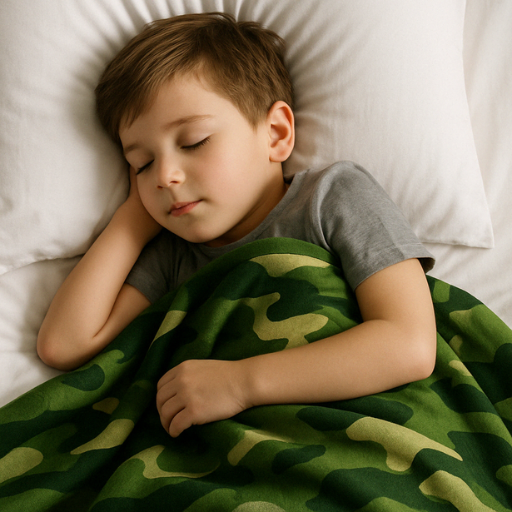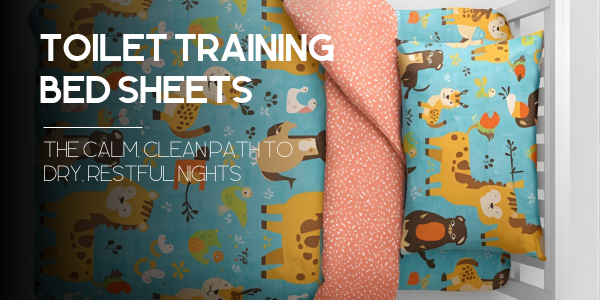Toilet Training Bed Sheets: The Calm, Clean Path to Dry, Restful Nights
Toilet Training Bed Sheets: The Calm, Clean Path to Dry, Restful Nights
Night accidents happen. Cleanup drama doesn’t have to. Here’s the evidence-based, real-life playbook—materials that actually protect, routines that actually stick, and mindset shifts that protect your child’s confidence.
Quick Table of Contents
Nighttime Dryness Lags Daytime—Totally Normal
Bladder capacity, brain–bladder signaling, and arousal from deep sleep mature on their own timetable. Translation: a child can crush daytime potty training yet still have nighttime accidents. That’s development—not failure.

Normalize it: Millions of families navigate bedwetting in early childhood. Your job isn’t “perfect nights.” It’s a calm plan that protects sleep, mattresses, and confidence.
For a pediatric-aligned primer on what’s typical and when to get extra help, bookmark our potty training fact sheet.
The Evidence-Based Playbook (Not Internet Myths)
What helps
- Encouragement, not pressure. Celebrate trying, not just outcomes.
- Daytime hydration + bathroom before lights-out.
- Consistent sleep times, small nightlight path to the toilet.
- Address constipation if present; it’s a sneaky contributor.
- For older kids: consider enuresis alarms after a pediatric check-in.
What to skip
- Punishments or shame (backfires, full stop).
- Over-restriction of fluids all day (often makes things worse).
- Assuming “they’re lazy” (it’s neurological maturation).
Curious how modern gear supports the science? Deep-dive our product engineering notes on the sci-tech principles behind quiet waterproofing.
Where Toilet Training Bed Sheets Fit: Speed, Sleep, Sanity
Think of reusable, waterproof bed pads as your 2 a.m. “reset button.” Accident happens → strip pad → drop a fresh one → everyone back to sleep in ~10 seconds. No full sheet change, no cold-shock bedding, no meltdown.
10-Second Reset (How-To)
- Peel off the wet pad (top layer only).
- Pat dry; quick pajama switch if needed.
- Lay down a fresh pad; lights dim; back to bed.
Want the step-by-step visuals? See expert tips to use bed pads.
When you’re ready to kit-up, browse the broader Chooniez collections for sizes and use-cases.
Materials Matter: TPU vs PVC (Why Parents Care)
TPU waterproofing

Thermoplastic polyurethane (TPU) is flexible, quiet, and designed for durable, kid-friendly waterproof barriers when formulated correctly.
PVC/vinyl
Vinyl often relies on plasticizers (phthalates). Many families prefer to avoid the crinkle, odor, and potential chemical concerns.
| Criteria | TPU-backed pads | PVC/vinyl pads | Cotton-only liners |
|---|---|---|---|
| Waterproofing | Excellent (designed barrier) | Excellent | Poor (absorbent, not waterproof) |
| Noise | Quiet | Crinkly | Quiet |
| Comfort | Soft & flexible | Stiffer | Soft |
| Care | Machine-wash; low heat | Machine-wash; may off-gas | Machine-wash; leaks |
Why we don’t recommend legacy vinyl solutions for kids: read the rubber-sheet reality check.
How to Choose Toilet Training Bed Sheets (Quick Checklist)
Absorbency & coverage
Look for absorbency ratings that match heavy sleepers, plus generous coverage (twin width with tuck-in wings minimizes shifting).
Slip resistance
Non-slip backing or tuck-under wings matter—bunched pads leak. See the “game-changer” explainer on why bedwetting sheets are different.
Comfort & breathability
Quiet, soft top layers help kids sleep through the night.
Skin friendliness
For sensitive sleepers, hypoallergenic build can be a lifesaver. Learn more about hypoallergenic sleep gear.
Laundry Science 101: Faster Turnovers, Longer Lifespan
Do this
- Cold-to-warm gentle cycle, mild detergent, extra rinse.
- Low-heat tumble or air-dry to protect the waterproof membrane.
- Wash separately from items with zippers/Velcro.
Avoid this
- Bleach and fabric softeners (degrade fibers/membranes).
- High-heat drying (can warp the barrier).
Dealing with mattress accidents too? Keep our mattress-cleaning guide handy.
And for seriously odor-averse households, the science-backed wash routine is gold.
Behavior + Bedding = The “Dry Nights System”
Evening rhythm
- Hydrate earlier in the day; bathroom before bed.
- Soft nightlight + clear path to the toilet.
- Calm language: “Bodies learn at night while we sleep.”
For the whole philosophy in one hit, explore our nighttime potty training guide.
Gear that supports
- 2–3 reusable pads in rotation.
- Optional mattress encasement for heavy wetters.
- Alarm pathway for older kids (after pediatric chat).
Curious about devices? Here’s the ultimate checklist.
Talking about it with your child? Try these words: gentle talk tracks that build agency.
Confidence First: Emotional Health & Scripts
Shame shrinks motivation. Dignity builds it. Make bedwetting boring—like brushing teeth. Consistency + empathy beats intensity every time.
Need inspiration on breaking stigma (especially for older kids)? This piece is a parent favorite: real solutions for teenagers.
Cost & Sustainability Math: Reusable vs Disposable
Reusable pads pay for themselves, fast. Fewer full-bed flips, less trash, more sleep. We ran the numbers.
| Scenario (6 mos) | Reusable pads | Disposable pads |
|---|---|---|
| Typical usage | 3 pads rotated | 1–2 per night |
| Estimated total items | 3 | 180–360 |
| Landfill impact | Low | High |
For the full eco and wallet picture, see our reusable vs disposable analysis.
Chooniez Spotlight: Designed for Real-Life Nights
What parents feel at 2 a.m.
- “Please be quick.” → Non-slip, quick-swap format.
- “Please be quiet.” → Soft top, low rustle.
- “Please protect the mattress.” → High-capacity absorbent core + waterproof backing.
Why modern pads beat towels + trash bags: beyond towels & tears.
Ready to try?
Best seller The Chooniez Bed-Wetting Throw Blanket keeps beds dry while protecting sleep and dignity.
Buy the Bed-Wetting Throw Blanket
Traveling or camping? Consider our Organic Incontinence Sleeping Bag—discreet protection beyond the bedroom.
New to the category? Start with the big-picture primer: the complete resource for bed-wetting sheets.
Decision Guide: Match Your Household to the Right Setup

New to night training
2–3 pads in rotation, twin width with tuck-in wings, quiet top layer.
See how modern pads changed the game: why modern pads matter.
Heavy sleepers & heavy wetters
Alarm + highest absorbency + mattress encasement. For nuanced, age-specific advice, try our 7-year-old strategies and 8-year-old guide.
Shared rooms, bunk beds, sleepovers
Discreet, fast swaps + privacy plan. Our travel guide covers real-world logistics.
Chair, couch, car seat coverage
Accidents aren’t only in beds. Learn chair-pad hacks in the leak-free chair-pad guide.
Myths vs Facts (SERP Debunks)
“Waking them to pee cures bedwetting.”
It keeps sheets dry tonight; it doesn’t teach independent arousal. Focus on routines + protection + time.
“It’s their fault.”
Nope. This is maturation. If you want a lighter read that still packs science, try our quiet science-backed guide.
“Rubber sheets are fine.”
They’re noisy, sweaty, and old-school. Modern TPU-backed pads are quieter and comfier.
Curious about stigma and stories? Grab a dose of hope from 10 inspiring bed-wetting stories.
Keep Learning (Zero Shame, All Solutions)
Start with the culture shift: why potty-training rubber sheets need to go.
Why washable pads are trending (for good reason): the next big thing.
Chair-pad skin comfort matters: sensitive-skin guide.
Stress connection (for adults in the home): stress & adult bedwetting.
FAQs: Toilet Training Bed Sheets
Do toilet training bed sheets actually work?
Yes—when they’re designed with high-capacity cores, quiet tops, and non-slip/tuck features. They don’t “cure” bedwetting; they protect sleep while bodies mature. For a parent-level overview, see why innovative sheets change confidence.
TPU vs PVC—what’s safer for kids?
Many parents prefer TPU-backed pads for soft, quiet protection. Traditional PVC often crinkles and may involve plasticizers. Read the rubber-sheet alternatives breakdown.
How many pads do we need?
Two to three in rotation is the sweet spot—one on the bed, one in the hamper, one clean and ready. Curious about setup flow? Our why parents love washable pads article maps it out.
How do I wash waterproof bedwetting sheets?
Gentle cycle, low heat, skip bleach/softeners. We share stain/odor science in the best-way wash guide.
When should I talk to a pediatrician?
New-onset bedwetting after a dry stretch, daytime symptoms, or ongoing concerns: loop in your pediatrician. For a wider context, skim our positive forward-thinking guide.
What about nap time or travel?
Nap-time strategies live here: dry-afternoon guide. Travel game plan here: ultimate survival guide.
Quiet Protection, Clear Results (See It Up Close)
Tap the image to zoom.

Modern TPU layers create a soft, flexible barrier—no “crinkle,” no plasticky sleep. That’s the difference your kid feels.
Go Deeper (Expert-Backed, Parent-Approved)
- Modern washable tech overview: how waterproof blankets change bed-wetting.
- Potty training attitudes that actually work: daytime wins, dry nights.
- Potty training readiness matters: evidence-based readiness quiz.
- If nap resistance is your nemesis: nap-time action guide.
- Culture shift at preschool age: the preschool revolution.
Ready for Calm, Clean Nights?
Build a simple kit—2–3 pads, quiet routine, zero shame. It’s not magic. It’s good design + good habits.







Leave a comment